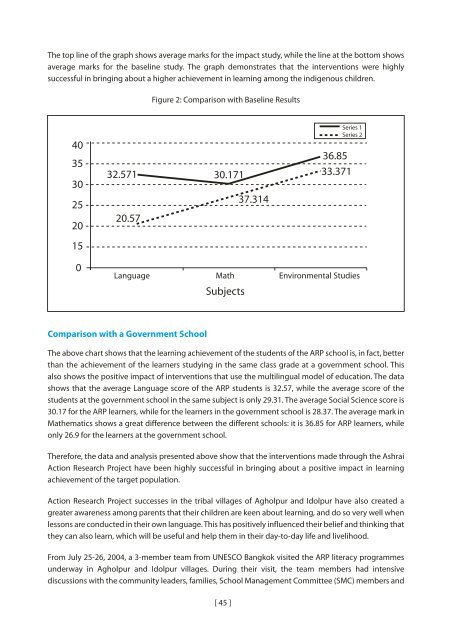Mother Tongue-based Literacy Programmes: Case Studies of Good ...
Mother Tongue-based Literacy Programmes: Case Studies of Good ...
Mother Tongue-based Literacy Programmes: Case Studies of Good ...
Create successful ePaper yourself
Turn your PDF publications into a flip-book with our unique Google optimized e-Paper software.
The top line <strong>of</strong> the graph shows average marks for the impact study, while the line at the bottom showsaverage marks for the baseline study. The graph demonstrates that the interventions were highlysuccessful in bringing about a higher achievement in learning among the indigenous children.Figure 2: Comparison with Baseline Results403530252032.57120.5730.17137.31436.8533.371Series 1Series 2150Language Math Environmental <strong>Studies</strong>SubjectsComparison with a Government SchoolThe above chart shows that the learning achievement <strong>of</strong> the students <strong>of</strong> the ARP school is, in fact, betterthan the achievement <strong>of</strong> the learners studying in the same class grade at a government school. Thisalso shows the positive impact <strong>of</strong> interventions that use the multilingual model <strong>of</strong> education. The datashows that the average Language score <strong>of</strong> the ARP students is 32.57, while the average score <strong>of</strong> thestudents at the government school in the same subject is only 29.31. The average Social Science score is30.17 for the ARP learners, while for the learners in the government school is 28.37. The average mark inMathematics shows a great difference between the different schools: it is 36.85 for ARP learners, whileonly 26.9 for the learners at the government school.Therefore, the data and analysis presented above show that the interventions made through the AshraiAction Research Project have been highly successful in bringing about a positive impact in learningachievement <strong>of</strong> the target population.Action Research Project successes in the tribal villages <strong>of</strong> Agholpur and Idolpur have also created agreater awareness among parents that their children are keen about learning, and do so very well whenlessons are conducted in their own language. This has positively influenced their belief and thinking thatthey can also learn, which will be useful and help them in their day-to-day life and livelihood.From July 25-26, 2004, a 3-member team from UNESCO Bangkok visited the ARP literacy programmesunderway in Agholpur and Idolpur villages. During their visit, the team members had intensivediscussions with the community leaders, families, School Management Committee (SMC) members and[ 45 ]

















